Atlantic Monthly Contributors's Blog, page 107
August 4, 2016
Locked Out of Rio

NEWS BRIEF Of all the possible ominous starts to the Olympic Games, losing the key to a stadium has got to be up there.
The games don’t officially begin until Friday. But on Wednesday, the women’s soccer tournament kicked off early, because space is limited at the Marcaña Stadium, which will host the opening and closing ceremonies, too. The national teams of the United States and New Zealand were scheduled to play, but there was one problem: Olympics officials realized they’d lost the key to the stadium’s east gate. Firemen were dispatched, and they chopped off the lock with bolt cutters.
It sounds too ridiculous to be true, but alas, there’s video evidence:
What a start! #Rio2016 kicking off with lost key and firemen forcing open lock to east gate of Olympic stadium #oops pic.twitter.com/7yj0moF9Ms
— Julia Carneiro (@juliadcarneiro) August 3, 2016
The lead-up to the Rio Olympics have seemed like one trial after another. There have been massive protests over the exorbitant cost of the games against the backdrop of rampant poverty. The ocean where athletes will swim, boat, and row, is mired in sewage. Athletes have been mugged on their way to train, and as they evacuated their building in the Olympic village after it caught fire. During the Olympic torch relay, a rare Amazonian jaguar brought in for the occasion was shot and killed when it tried to escape. And the Zika virus outbreak has some athletes and foreign visitors on edge.
Given all that, a key may seem like a small matter.

The First Woman of Color to Make a $100M Movie

Hollywood made its very first $100 million film in 1994 with True Lies, directed by James Cameron. In the 22 years since, the industry has seen an explosion of films (335 to be exact) that have cost nine-digit sums to make, but not a single woman of color has been at the helm of one until now. Earlier this year it was announced that the Selma director Ava DuVernay would make A Wrinkle in Time, an adaptation of Madeleine’s L’Engle’s beloved children’s book of the same name. That in itself—a woman of color directing a major Disney film—was a significant accomplishment. But on Wednesday, the California Film Commission shared a list of projects that would receive tax credits, confirming that A Wrinkle in Time’s production budget would total at least $103 million.
Women, much less women of color, rarely get to direct feature films, let alone expensive studio blockbusters (women make just 3 percent of all big box-office movies). Working on A Wrinkle in Time puts DuVernay in the rarest of company—only Kathryn Bigelow (K-19: The Widowmaker) and Patti Jenkins (next year’s Wonder Woman) have crossed the $100 million mark—though she acknowledges that her talent alone didn’t let her make history.
Not the first capable of doing so. Not by a long shot. Thanks to @DisneyStudios for breaking this glass with me. https://t.co/iXJ9pgV7eP
— Ava DuVernay (@AVAETC) August 3, 2016
Those defending Hollywood’s lack of diversity among directors commonly cite inexperience as a major reason for hiring mostly white men. The latest evidence against this much-debunked myth is the upcoming film Suicide Squad, which cost $175 million and was directed by David Ayer, “who had never made a giant, effects-packed action movie,” according to The Hollywood Reporter. The outlet’s investigation of Suicide Squad’s production woes reaffirmed how “not experienced enough” is at best a disingenuous excuse, and at worst a willful obfuscation of how tentpole economics work.
Hiring filmmakers who lack such [blockbuster] experience is the trend, and it’s often out of necessity. “There are a lot of people who don't want to direct those movies and that's a huge problem,” says one producer with franchise experience. “A lot of the proven guys are back-to-back with their stuff, or they want to develop it for five years, and there's a machine that has to be fed. And there’s the economics.” Seasoned directors are expensive, meaning studios turn to those with less experience, relying on instinct that they will be up to the job. Sometimes it works (Colin Trevorrow on Jurassic World), and sometimes it doesn’t (James Bobin on Alice Through the Looking Glass).
This should ostensibly mean that blockbusters are a training ground—or a crash course—for directors looking to make the leap to more ambitious projects. DuVernay will come to A Wrinkle in Time with an arguably stronger resume than many first-time tentpole directors: Her previous (and third) feature film, Selma, cost $20 million and made more than three times that amount while garnering several Oscar and Golden Globe nominations.
It’s fitting that the first woman of color to helm a $100 million film has also been a lot of other “firsts”: the first black woman to win best director at Sundance, the first black female director to be nominated for a Golden Globe, and the first to have a film nominated for an Oscar. (A Wrinkle in Time, out next year, will star another, even more monumental achiever of “firsts” in Oprah Winfrey.) DuVernay is now enjoying momentum in her career that will likely help her smash plenty of other barriers, showing studios that women and people of color belong—and have always belonged—in the director’s chair.

The Charges Against Fethullah Gulen
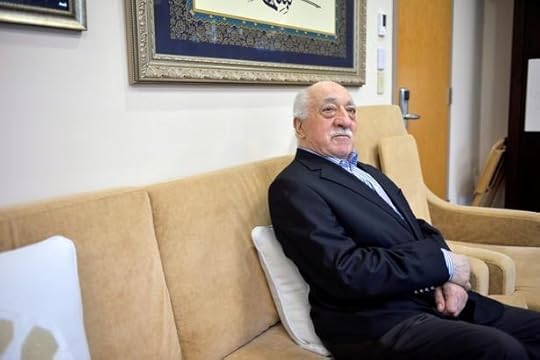
NEWS BRIEF A Turkish court Thursday issued an arrest warrant for the man it says masterminded the failed coup attempt in July—as it moves closer to formally seeking Fethullah Gulen’s extradition from the U.S.
Gulen, a former ally of Turkish President Recep Tayyip Erdogan, now lives in Pennsylvania. The Turkish government has accused him of ordering the plot that left more than 270 people dead on July 15. Gulen has denied these accusations.
Before Turkey formally requests Gulen’s extradition, the U.S. said it needed further evidence of his involvement in the coup attempt. This warrant may be that attempt. Gulen has long been sought by the Turkish government for what officials say is illegal activity. Al Jazeera reports:
In the past, he has been accused of being the leader of an organisation that illegally tapped into the conversations of Erdogan and former prime minister Ahmet Davutoglu.
Turkey has designated Gulen's movement, which runs charities, schools and businesses across the world, as a "terrorist organisation" and has launched a widespread crackdown on suspected members since the failed coup.
Turkey has cracked down on civil society since the putsch, arresting some 26,000 people and dismissing another 70,000 people in the military, civil service, media, and academia. Critics say Erdogan is purging Turkish society of his critics. Erdogan has said Gulen and others have “blood on its hands.” More arrests are expected.

August 3, 2016
The End of Trump Taj Mahal
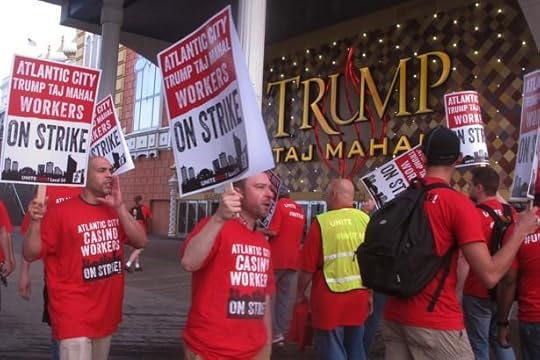
NEWS BRIEF The Trump Taj Mahal Casino in Atlantic City, New Jersey, will close after Labor Day weekend following one month of union strikes, the Press of Atlantic City reports.
“Currently the Taj is losing multi-millions a month, and now with this strike we see no path to profitability,” Tony Rodio, president of Tropicana Entertainment, which manages the casino, said in the statement Wednesday.
The strike by Unite Here Local 54, a union representing hospitality workers in Atlantic City, began in July in protest of the casino’s lack of health insurance and pension benefits. A federal judge permitted the casino to eliminate those benefits in 2014, when Trump Entertainment Resorts filed for bankruptcy. The casino was built by Republican presidential candidate Donald Trump, then-Trump Entertainment Resorts chairman, in 1990. Trump resigned as chairman following the company’s bankruptcy in 2009, though he maintained a 10 percent interest in the casino because it retained the name “Trump Taj Mahal.”
Icahn Enterprises, owned by investor Carl Icahn, bought the casino—including the 10 percent stake owned by Trump—after it emerged from bankruptcy in February.
The strike, composed of more than 1,000 resort workers, is one of the longest strikes in Atlantic City’s 38-year casino history.
Bob McDevitt, president of Unite Here Local 54, said in a statement Wednesday:
These workers are exercising their fundamentally American right to stand up for themselves in the face of injustice. Carl Icahn took it personally. This is clearly not a business decision – a few million dollars is a drop in the bucket compared to the money he publicly promised he would put into the Trump Taj Mahal. It’s a classic take-the-money-and-run: Icahn takes hundreds of millions of dollars out of Atlantic City and then announces he is closing up shop.
The closure is expected to cost 3,000 jobs and bring the number of Atlantic City casinos down to seven. The city lost 8,000 jobs and four casinos in 2014: The Atlantic Club, Showboat, Revel, and Trump Plaza.

A Transgender-Rights Ruling Blocked
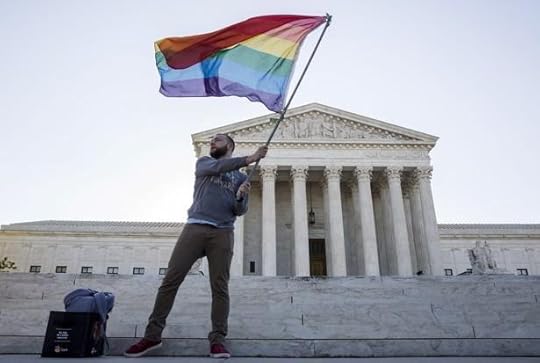
NEWS BRIEF In a rare break from its summer recess, the U.S. Supreme Court temporarily blocked a federal appeals court ruling Wednesday that allowed a transgender boy in Virginia to use the boy’s bathroom at his local public high school.
The 16-year-old boy, Gavin Grimm, was born biologically as a female but identifies as male. According to CNN, school officials originally allowed him to use the boys’ bathroom after he began transitioning but reversed course after a few parents complained.
The Fourth Circuit Court of Appeals sided with the boy in Gloucester County School Board v. G.G. in April, ruling that the Education Department could include gender identity as one of the categories covered by Title IX. The school board then asked the Court to stay the ruling pending their appeal.
Although Justice Antonin Scalia’s death in February left the Court with only eight justices, five votes are still required to grant a stay under its rules. Justice Stephen Breyer sided with the Court’s conservative wing to provide a fifth vote, which he described as a courtesy to his colleagues.
“In light of the facts that four Justices have voted to grant the application referred to the Court by the Chief Justice, that we are currently in recess, and that granting a stay will preserve the status quo (as of the time the Court of Appeals made its decision) until the Court considers the forthcoming petition for certiorari, I vote to grant the application as a courtesy,” Breyer wrote.
Courtesy votes for a stay aren’t unusual in the Court’s history, although the justices rarely describe them as such to the public. Justices Ruth Bader Ginsburg, Sonia Sotomayor, and Elena Kagan indicated they voted to allow the Fourth Circuit’s ruling to go into effect.
The stay will remain in effect until the Court can consider the school board’s request for an appeal when its next term begins on October 4.

Obama's Historic Day of Clemency
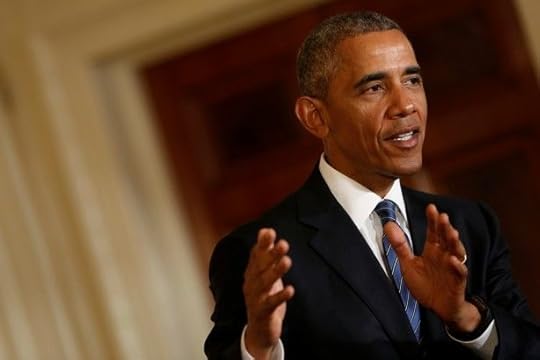
NEWS BRIEF President Obama has commuted the sentences of more than 200 people, a move the White House hailed as the most grants of presidential clemency in one day in more than a century.
The White House said Wednesday 214 people convicted of federal crimes had their sentences commuted. Many of them were convicted of nonviolent drug-related crimes.
“Today began like any other for 214 federal inmates across the country, but ultimately became a day I am confident they will never forget,” White House Counsel Neil Eggleston said in a statement. “This morning, these individuals received a message from the President: your application for clemency has been granted.”
Obama’s commutations came amid a broader effort by his administration to reduce excessive sentences in the federal criminal-justice system. With more than 200,000 inmates currently housed in federal prisons, Wednesday's announcement won't significantly reduce the federal prison population. But for the hundreds of inmates whose sentences were shortened, the president’s move is life-changing.
Buzzfeed has more:
Including Wednesday’s commutations, Obama has granted a total of 562 commutations — a number that the White House says is more than the previous nine presidents combined but that has been questioned by some advocates who point to the amnesty program and subsequent actions taken by President Gerald Ford regarding those who evaded the Vietnam War-era military draft.
While many of Wednesday’s commutations mean that those people will be released from prison by the end of the year, the 214 commutations take a variety of forms. Some people have their sentences merely reduced, but they will continue to be imprisoned for the near term. Others have release dates set for a year or two from now. Some of the commutations include conditions, including enrollment in a residential drug treatment program.
Under the Constitution, the president enjoys unfettered power to commute and pardon the sentences of people accused and convicted of federal crimes. Most modern presidents defer to the U.S. Pardon Attorney, a Justice Department official, when choosing eligible recipients.
Criminal-justice activists have frequently criticized the office as a bottleneck in the pardoning system. To accelerate the process, Obama supported a project in 2014 by the Justice Department and a small army of volunteer lawyers to separately review tens of thousands of pardon requests before he leaves office.

What’s Wrong With the DC Comics Movie Franchise?
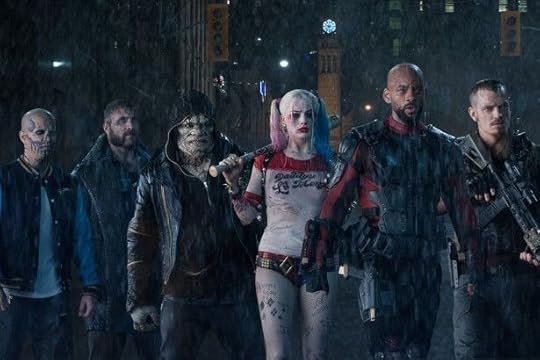
When a studio is launching a franchise, one bad movie is an anomaly, two is a problem, and three in a row spells possible disaster. This is the issue facing Warner Bros., which on Friday is releasing its third and newest entry in the universe of films based on DC Comics. Early reviews for Suicide Squad have been largely unkind. Fan outrage is already reaching fever pitch: A petition calling for the shutdown of the review-aggregation website Rotten Tomatoes has 13,000 signatures from viewers upset with Suicide Squad’s poor ratings. Rumors of massive studio interference with the film are already beginning to leak out. As a narrative of damage control takes hold, it’s becoming clearer what mistakes the studio has made in trying to roll out an entire cinematic universe—and how it can turn things around for the future.
A tale about demented villains forced to team up by the government, Suicide Squad is tracking to open big at the box office, but poor word of mouth and bad reviews can cost a film in the long run. Those things are what kept previous DC entries Man of Steel and Batman v Superman from crossing the coveted billion-dollar mark worldwide, an increasingly essential milestone for these films, which tend to cost between $300 and $400 million to make, market, and distribute. DC’s comic-book rival Marvel has released four billion-dollar grossers so far, and its future lineup looks stacked with more guaranteed hits. The key difference between the two? Marvel has already established the identity of its franchise, while the DC Extended Universe—three films in—is still trying to define itself.
The Hollywood Reporter’s deep dive into Suicide Squad’s troubled production sums up the panicky creative approach that led to the film, which is a jumbled mess. Clocking in at just over two hours (relatively trim for a superhero movie), it rushes through the job of introducing its massive ensemble of antiheroes, and it is far too reliant on clunky music cues and hasty voice-over exposition. Some characters show up out of nowhere and are introduced with a single line of dialogue; others disappear from the plot without ever being addressed. The film’s tone swings wildly between brutal, dark action and whimsical comedy throughout, which is apparently partly thanks to an early, comedy-heavy trailer.
A previous cut of the film, which is written and directed by David Ayer (a purveyor of grim action dramas like End of Watch and Fury), apparently disappointed the studio. “So while Ayer pursued his original vision, Warners set about working on a different cut, with an assist from Trailer Park, the company that had made the teaser,” reports The Hollywood Reporter’s Kim Masters. Having a trailer company prepare a feature-length film would be an unprecedented move for a blockbuster, but according to Masters, the studio tested both its cut and Ayer’s with audiences (its cut won out) before ordering extensive reshoots.
It’s already a bad sign that, even before its release, Suicide Squad has been the subject of a lengthy article investigating what went wrong. Even worse, these reports recall the same uncertainty that plagued Warner Bros. after the release of Batman v Superman, which prompted extensive managerial shake-ups. The DC Extended Universe is at risk of being defined by its most rabid fans, who harass critics online for writing negative reviews and rally for the closure of Rotten Tomatoes (a website that is, ironically, partly owned by Warner Bros.). The whole endeavor seems caught in a feedback loop of reshoots, behind-the-scenes tumult, and negative press, with huge expectations being placed on the next DC project—first Suicide Squad, and now Wonder Woman, due for release in June 2017.
If Suicide Squad doesn’t land with viewers, Wonder Woman will be hailed as DC’s next great hope.
The irony is that all of these problems have haunted Marvel Studios in the past. One of its earliest efforts, Iron Man 2, was a poorly received mess that reeked of studio meddling, sacrificing a coherent plot to lay groundwork for an upcoming slate of new heroes who would eventually form The Avengers. The studio has picked exciting directors like Edgar Wright (originally slated to make Ant-Man), only to part ways with them over “creative differences” at the last minute. Actors have been recast, films have performed tepidly with critics, and creative giants like Joss Whedon have called Marvel’s filmmaking process “really unpleasant.”
But Marvel has ultimately been successful because the studio has something the DC films so far have seemingly lacked—a honcho who oversees each work every step of the way, in producer Kevin Feige. Though directors are in charge of their own projects, Feige has shaped the whole franchise’s storytelling direction from the very beginning, lending an air of stability to the endeavor. It helps that the entire roll-out of films was meticulously planned out of necessity: When Marvel took out a $525 million loan in 2005 to launch its first slate of superhero movies, it was risking its entire financial future. Feige and directors like Jon Favreau, James Gunn, and Whedon helped turn B-list comics characters like Iron Man, Thor, and the Guardians of the Galaxy into stars. Now, it’s on secure enough ground to launch new titles like Black Panther, Captain Marvel, and Doctor Strange.
Warner Bros.’ approach to its DC heroes was more haphazard. In picking Zack Snyder, the director of grim comic-book adaptations like 300 and Watchmen, to direct its 2013 Superman reboot Man of Steel, the studio opted for a far darker tone than Marvel’s raucous, more comedic approach. Though Man of Steel was not quite the hit the studio hoped for, it did well enough to greenlight a sequel that was turned into a franchise-starter: Batman v Superman, which was later given the awkward subtitle Dawn of Justice.
The creative burden placed on that film was extraordinary: It had to introduce Batman and Wonder Woman, function as a Superman sequel, and set up the premise of the Justice League, DC’s Avengers-like super-team. No Marvel movie was ever given such a task, and the ones that have come closest to feeling overloaded—Iron Man 2 and Avengers: Age of Ultron—are among the franchise’s least popular. Batman v Superman was critically derided, and Suicide Squad was then handed the mantle of franchise savior, in hopes that a funnier tone might help it stand out. Meanwhile, Snyder (still directing Justice League) has been reportedly downgraded within the larger creative structure, with the DC Comics honcho Geoff Johns being tapped for a Kevin Feige-like role at Warner Bros.
If Suicide Squad doesn’t land with viewers, then Wonder Woman will be hailed as DC’s next great hope, as the first film to star the female icon of its title (being played by Gal Gadot). Marvel’s genius throughout has been to avoid those unfair expectations, and strike a balance between movies that tell individual stories while keeping one eye on the next few entries. It could only take one big, well-received hit for the DC universe to start turning itself around. But until then, the franchise won’t be able to shake its image as being continually stuck a few steps behind its competitors.

The Start-Up Company Going to the Moon
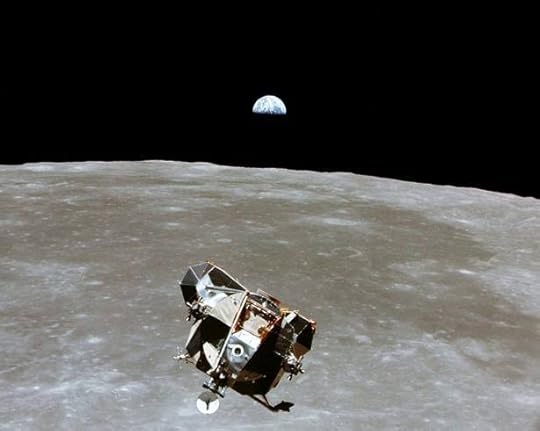
NEWS BRIEF In a space first, the U.S. government gave approval Wednesday for a private company to fly beyond Earth’s orbit and land on the moon in 2017.
The FAA has approved the first commercial #space payload intended to land on the Moon: https://t.co/iSC5XTNPyw pic.twitter.com/OtQ0le0hVY
— The FAA (@FAANews) August 3, 2016
Moon Express first submitted its request to pursue the lunar mission in April. The decision, made in coordination with the Federal Aviation Administration, the State Department, and NASA, will allow Moon Express to send a robotic, suitcase-sized spacecraft to the moon for a two-week mission.
This will be the first time a non-government entity has flown beyond Earth’s orbit and landed on the moon. It is expected to hold commercial cargo and a number of experiments, which include cremated human remains.
Moon Express said in a statement Wednesday:
This breakthrough U.S. policy decision provides authorization to Moon Express for a maiden flight of its robotic spacecraft onto the Moon’s surface, beginning a new era of ongoing commercial lunar exploration and discovery, unlocking the immense potential of the Moon's valuable resources.
The mission is expected to establish a legal framework for future private-sector expeditions into space. In April, Space Exploration Technologies announced its own aspirations to send a spacecraft to Mars.
Previously, no government agency had the authority to oversee private missions to space, though the 1967 Outer Space Treaty stipulates that the United States is responsible for any missions into space by its own non-government entities.

Bachelor in Paradise Has ... Serious Things to Say About Abuse

[Warning: Spoilers ahead.]
Bachelor in Paradise is a thoroughly absurd summer TV show, and it is, as such, a perfect summer TV show. The all-star version of The Bachelor and The Bachelorette, it gathers contestants from previous seasons—a combination of the most likable, the most controversial, and the most dramatic—to spend a few weeks at a beach resort in Mexico. The stated purpose of all this, as host Chris Harrison puts it, is to give the contestants “a second chance at love.” The real purpose, though, is to give ABC another way to profit off of the Bachelor franchise, and also to give superfans of The Bachelorette a way to cope with the show’s loss, now that its season has ended. In that capacity, as wacky televisional methadone, Bachelor in Paradise is extremely successful. “It is truly a train wreck,” Harrison said on Monday, introducing a teaser of the show to viewers of the Bachelorette finale. He meant this as a compliment.
Related Story

Oh, Chad! The Making of The Bachelorette's Most Authentic Villain
But: That’s not all that Bachelor in Paradise is. The premiere of the show’s second season, on Tuesday evening, also functioned as … cultural commentary. No, but really. The episode took on, in its haphazard way, serious topics—violence and abuse and consent and its absence. The episode had Things to Say about those topics and the way they can mingle into, yes, rape culture. No, but really.
Here’s what happened, in a (coco)nut shell: Chad—nickname: “Meat Chad,” the villain of JoJo’s season—came to Paradise with a stated objective of, as per the show’s framing, maybe “finding love.” And for a moment it looked like he might have found it. Chad and Lace, the villain of Ben’s season (the lady best known for her unfortunate, repeated insistence that “I’m not crazy”), hit it off immediately. They flirted. They drank. They power-struggled. They seemed to feed off of each other’s wackiness. They fought, playfully. They made up. They made out. They got really friendly with the wall of an infinity pool.
“You know how rats will have a lot of sex and then, like, eat each other?” one contestant said, observing the pair’s singular mating rituals. It was, for a moment, reality-show perfection.
“That’s actually scary and abusive and weird behavior that shouldn’t be happening.”
But then things—jarringly—took a turn. Suddenly, Lace was telling Chad to get away from her. He ignored her, seeming to treat the request as a joke. She persisted: “No, I mean it.” And, at that point, all talk of joking disappeared. Chad called Lace a bitch. Joining the group, he made fun of another contestant’s physical disability. He called that woman a bitch, too. He also, summoning his MO from The Bachelorette, threatened violence against several cast members. It was a threat that, made in mixed company rather than toward several similarly beefy men, effectively transformed Chad from villain to menace. “Chad’s talking about murder, rape, killing,” Daniel, Chad’s friend from JoJo’s season, said, seeming genuinely shocked at the turn things had taken.
“If this continues,” Carly, one of the other contestants, said, “it’s gonna get so messy.” This, it turns out, was an understatement. “At one point I was scared for multiple people,” Amanda, from Ben’s season, said.
Many of the other women on the show came together to decry Chad’s behavior—to the camera, and ostensibly to the show’s audience. “Every time Chad’s around, it just makes me nervous,” Carly confessed, “because that’s actually scary and abusive and weird behavior that shouldn’t be happening.”
“I didn’t come to Paradise to be surrounded by drunk, aggressive, abusive jerks,” Sarah, from Sean’s season—the woman he had called a “one-armed bitch”—told Chad.
And then:
“The way you’re talking about women is so disrespectful. I want nothing to do with it. Nothing.”
“To let Chad stay on the show and talk about women the way he does—I just can’t.”
“Chad’s behavior here doesn’t belong.”
Daniel, Chad’s friend, tried to warn him about the mutiny among his fellow cast members, particularly the women. “People are really scared right now,” Daniel told him.
Chad responded to this by accusing his friend of being insufficiently “murdery.”
Chad passed out, drunkenly, soon after that exchange, and that seemed to be the end of things. The next morning, though, Chris summoned the cast—to the “Rose Palapa,” natch—to make an announcement: Chad would be leaving Paradise.
“I saw what you said to Sarah,” Chris told him. “I saw what you did to Lace. I saw what you did to the staff of this hotel.”
“This is fun!” Chad insisted. “I didn’t have fun last night,” Lace replied.
Chad protested. He tried to write off his behavior, again, as a joke. “This is fun!” he insisted, to Lace.
“I didn’t have fun last night,” she replied.
And that was the final word. Chad departed, angrily. The scene was unsurprisingly dramatic, but surprising, too, in its lack of drama: His condemnation was universal among the show’s host and cast and crew. So was the need for his departure. And that in itself was notable—and perhaps even praise-worthy? Bachelor in Paradise, particularly through its women contestants, summoned the language of abuse to describe Chad’s behavior. Its cast members mentioned rape and murder—not as accusations against Chad, but as logical extensions of the angry misogyny and blithe entitlement that Chad was suggesting through that behavior. Bachelor in Paradise, in its way, was tacitly illustrating rape culture.
Very tacitly, to be sure. This is a show that, when Chad arrived, showed glasses of water and margarita shaking in campy, Jurassic Park style. It’s a show that featured swole-dude Daniel (profession: “Canadian”) declaring, “I’m like a disease that won’t go away, like herpes or something.” It is also a show that found Evan (“Erectile Dyfunction Specialist”) going through Chad’s luggage and finding, still in its clam-cased packaging, a meat scale. Bachelor in Paradise offers a firm, bikini-clad rebuke to any contemporary notion of “prestige TV” or “premium viewing” or “human dignity.” It is not serious. It is actively, aggressively absurd.
But that is also what made the show’s treatment of Chad’s antics, in its way, especially powerful. Bachelor in Paradise, reveling as it does in the ridiculous, professes no political or cultural allegiance; it sees itself as so far beyond the confines of everyday life that it sets itself within an actual country but reclaims that land as, simply, Paradise. It offers pretty much the dictionary definition of “escapism.” And yet even this silly specimen of a cultural product—even a reality show that features a contestant declaring, “I’m in Port-o Vayart-ee and I’m ready to party!”—treated Chad’s behavior as beyond the pale. Even here, even within this context of no context, violence and abuse and misogyny would not be condoned. They would not, however good they may be as TV, be tolerated. It was a valuable, if sobering, message: Even in an escapist world, bad behavior can’t be escaped.

There's Probably Way More Zika in the United States Than Has Been Counted

Try as they might, public-health officials can’t really track the Zika virus in real time. There is inevitably a lag between how a disease spreads and when the public finds out about it.
Even in Miami, where new updates are being issued every weekday, there’s only so much officials know about how quickly and widely Zika is traveling through the population.
Then there are the unknowns that are harder to pin down: How many cases of Zika are going uncounted? It turns out, that number may be enormous.
Researchers at Northeastern University say federal-health officials are likely vastly undercounting Zika in the United States. In a paper that’s still under review for journal publication, they describe computer modeling that suggests there were nearly 30,000 cases of travel-related Zika in the country in mid-June, about 25 times more cases than the 1,200 or so reported by the CDC at the time.
“Models can be only as good as the data they ingest.”
Researchers found the undercounting occurred in at least nine states: Florida, California, Texas, Georgia, Illinois, North Carolina, Ohio, Indiana, and Oregon.
“CDC is doing a great job, but it is really hard to detect cases,” said Alessandro Vespignani, one of the authors of the paper. The federal agency is faced with an exceedingly difficult task, in part because it is cobbling together data from various monitoring systems in different states and jurisdictions. The nature of the virus presents additional challenges, making it more complicated to track than other epidemics. “You have to ingest much more data and deal with another level of complexity as well as other sources of uncertainties,” Vespignani said.
Because Zika is transmitted by mosquitoes (as well as spread between humans), researchers trying to model or predict its path have to take into consideration the presence of certain mosquito species, mosquito populations in different areas, that population’s variability with weather conditions, and so on. (Northeastern’s computer model does not take sexual transmission of Zika into consideration, even though it’s one of the ways the virus is transmitted.)
Vespignani and his colleagues also used their model to predict how Zika will continue to move through the Americas through the end of 2016, based on how it has spread globally since 2013. (They also took into account the rate of transmission of Dengue in various regions, since that virus has much in common with Zika.)
The modeling suggests that while the Zika epidemic has already peaked in Brazil, the number of cases is still growing rapidly in Puerto Rico, and will continue to climb well into the fall. And while the researchers say their findings should be interpreted cautiously, given the complexity of the modeling, they believe their projections offer important indications of “the magnitude and timing” of the epidemic as it progresses.
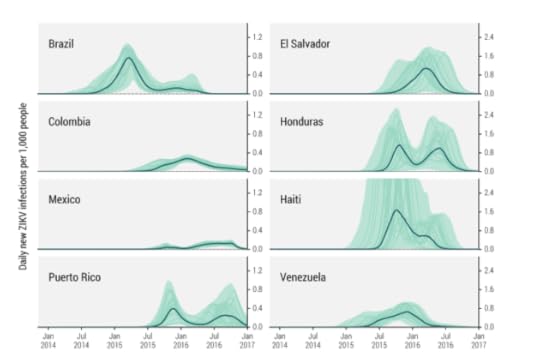
(Zhang et al.)
There are other computer-modeled predictions that could be useful—the estimated number of cases of Zika-related Microcephaly, a brain defect in which newborns have abnormally small heads, for example. But modeling such outcomes, especially when so much remains unknown about Zika, is difficult if not impossible without more robust clinical data. “Models can be only as good as the data they ingest,” Vespignani said.
For the CDC, good data may be the central challenge in tracking Zika. Because the agency only counts confirmed cases of the disease, and because people who catch Zika are usually asymptomatic, there are almost certainly a significant number of people who have had the virus without knowing it.
“Like the [Northeastern University] team, when we work on estimating components of the epidemic, we try to understand the dynamics of infection relative to the available information, always under the assumption that what we ‘see’ through surveillance is only the tip of the iceberg,” said Michael Johansson, a biologist in the CDC Division of Vector-Borne Diseases, in a statement provided to The Atlantic by a spokesman. “Many infections are asymptomatic, some are mild with symptoms that do not cause people to seek care, some cases are mistaken as other diseases, and then we get to the diagnostics which are also challenging.”
“All of those components contribute to many fewer cases being reported than the number of infections that actually occurs,” Johansson said.
What does all of this mean for people who just want to protect themselves from the virus? Zika should be taken as the serious threat to public health that officials have said it is. Though many cases of Zika are mild, scientists are just beginning to understand how devastating it can be—including among children and adults sickened by the disease, not just fetuses. In Utah, one man died from the virus. (And officials still don’t understand how a family member who cared for him contracted Zika.)
The CDC has clear guidelines on how people—particularly pregnant women—can protect themselves from the virus. Until scientists learn more about how Zika spreads and how it might be stopped, it’s important to understand it could be much more widespread than it appears.

Atlantic Monthly Contributors's Blog
- Atlantic Monthly Contributors's profile
- 1 follower



